Session # 2
REVISION-CHECK, CHECK MATE, STALE MATE, PIECE VALUE, CASTLE
It's necessary to revise the basics to make sure that they are well
understood in order to learn new things. This is what we will do in
the next few sessions.. Today we see the Check, Check mate, Stale mate,
Piece value and the castle.
The check happens when the king is in the way of an enemy piece, sort
of like if the king was another piece, the enemy could capture it, but
instead, because it's the king and we cannot capture the king, we say
that he is in check. The king doesn't have the right to stay in check,
so he must either move to a square where its not in check, capture the
piece that puts him in check or block the check with one of its pieces.
If he cannot do any of these 3 choices, meaning that he cannot get
out of check, he is checkmate and has lost the game. We can now say
that the goal of the game is to put the enemy in checkmate.
.
Sometimes it happens that the king is not in check and that there
aren't any legal moves to play, we say that the game is stalemate, meaning
that it's a draw, no one wins
Let's now take a look at the individual value attributed to each piece.
The value represents the strength pf each piece compared to another.
This is calculated with number of squares that one piece controls over
another and a variety of other variables that we will not study in detail.
The important thing is to know the individual value of each piece and
understand how to use this. The pawn is worth 1 point, the bishop and
the knight are each worth 3 points, the rook is worth 5 points and the
queen is worth 9 points, the king doesn't have any value because it
cannot be captured. More the value of a piece is high, the more its
powerful and consequently, the more its worth. It is important to know
this in order to decide if it is beneficial to make an exchange beforehand.
As an example; if we capture a queen with our rook and lose that rook
in the exchange, we win 4 points, meaning that the exchange was at our
advantage. It is also important to note that the player with the most
points has a greater chance of winning in the end.
Next, the castle is done with only the king and a rook, neither one
of the two must have moved during the game. The king must not be in
check, pass on a square where it is in check or land on a square where
it is in check. There must not be any pieces between the king and the
rook. The castle is done the following way:
The king moves two squares to the left or right and we put the rook
on the square immediately after the king. When the rook moves 3 squares,
we call it the big castle, when its only two, its called the small castle.
As a rule of thumb, it should be done early in the game to put the king
in security.
Here, the black king is in check by the white rook. black is not allowed
to stay in check, so they decide to BLOCK the check with their rook.
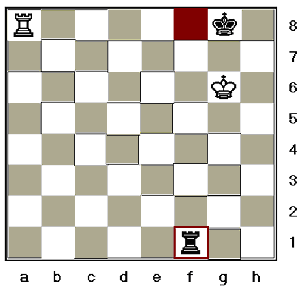
Here, the black king is in check by the white rook. Black MOVES their
king out of the way.
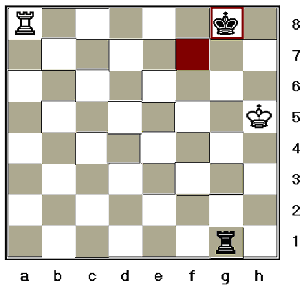
Here, black is in check mate because it cannot
do anything get out of the check, they lose the game.
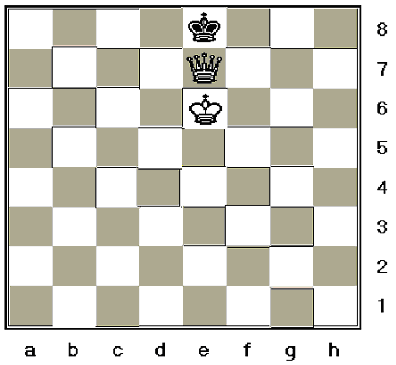
Here black is in check because they cannot move
any piece, everywhere the king moves, he puts himself in check. The
game is a draw.
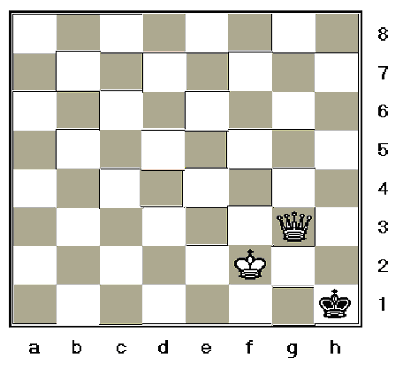
Here, if we add a pawn in the position it is not
a stalemate because black can move a pawn.
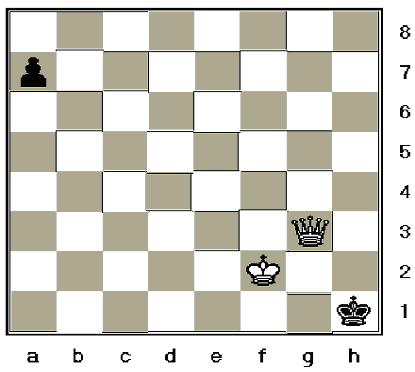
The movement of the big castle (or queen side)
always being careful to always move the king first.
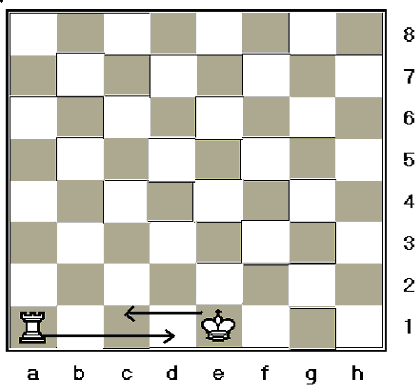
Here is the movement for the small (or king side)
castle.
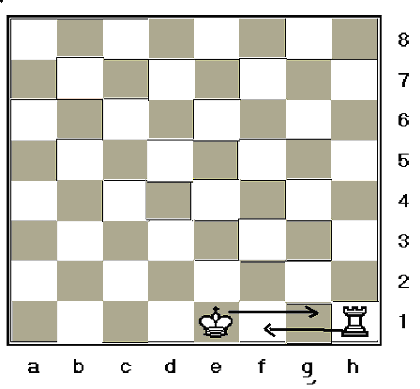
Choose your session:
1
- 2 - 3
- 4 - 5
- 6 - 7
- 8 - 9
- 10 -
11 - 12
- 13 -
14 - 15
- 16 -
17 - 18
- 19 -
20 - 21
- 22 -
23 - 24
- 25 -
26 - 27
- 28 -
29 - 30
